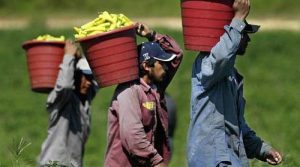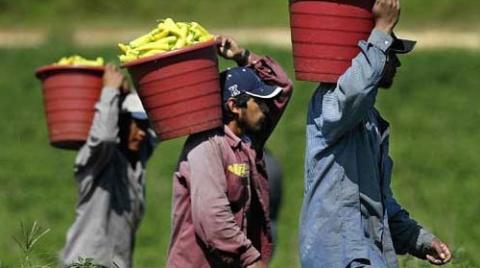First Person:
By Joaquín Magón
Coachella Unincorporated
Editor’s Note: They may be too young to remember Cesar Chavez, but young people in California’s Central Valley are keeping his dream alive by continuing to work for the rights of today’s farm workers. For organizers and agricultural laborers here, Cesar Chavez Day isn’t just celebrated on March 31, his birthday and the date he founded the United Farm Workers. His work lives on year-round in their daily lives and their struggle for fair working conditions. Joaquin Magon is a writer with the youth publication Coachella Unincorporated, a project of New America Media.
 I never met Cesar Chavez. The opportunity to shake his hand or hear him speak in person is not one that I had. But I feel I know him. I identify with the dream he had and the struggle that continues today. It’s been almost a year now since I began working with the United Farm Workers, and I have met farm workers and organizers who didn’t even know who Cesar Chavez was until recently.
I never met Cesar Chavez. The opportunity to shake his hand or hear him speak in person is not one that I had. But I feel I know him. I identify with the dream he had and the struggle that continues today. It’s been almost a year now since I began working with the United Farm Workers, and I have met farm workers and organizers who didn’t even know who Cesar Chavez was until recently.
But they live the struggle that he and Dolores Huerta started. It is his dream, I know now, that we are fulfilling when we fight for the rights of others. That is the Cesar that those of us who never met him know.
So this is how I honor and remember Cesar Chavez, a man of great strength, passion, and intelligence. Not through a personal story about how I shook his hand; but, rather, through two of my fellow organizers who never met him either but know his dream, and are continuing the work he started.
Gustavo
Gustavo is a United Farm Workers organizer from Oaxaca who has worked in the fields for 18 years. He learned about Chavez in1994 after Chavez had just passed away.
“I was in a town called Salinas and they didn’t want to give me work. The foreman mentioned something about Cesar Chavez and I didn’t know what he was talking about…By coincidence, and I remember this like it was yesterday, I was driving and I turned on my radio and that was Radio Tigre I think was the name. They were announcing that Cesar Chavez had just passed away. I thought to myself, ‘Wow, the foreman had just mentioned Cesar Chavez.’ But I thought he was talking about Julio Cesar Chavez, the boxer. That’s how I first learned about Cesar Chavez.”
Gustavo, like many other workers from Oaxaca, has faced discrimination for being indigenous. He works hard for low wages, and barely makes ends meet. However, his smile is as eternal as his struggle.
“You look at the price of the strawberry box and you know that most of that money is going toward the boss. The money doesn’t go toward the worker and it’s not just us but our children. Sometimes it’s embarrassing going out because your child will ask you for a toy or, you know, a childhood, or even food, and you don’t make enough to give to them; sometimes it’s best to not even go out.”
He says that he knows now how things are. Before he wouldn’t have raised his voice but now he says he knows that the workers deserve better.
“Those who don’t dream will not achieve anything; much less if you wait for someone to do it for you. Chavez did many incredible things. He did a hunger strike. What I’m doing right now isn’t at all easy. So I can’t imagine how he did it. It’s more than human what he did and I would love to be like Cesar Chavez.”
Marichel
Marichel came to California from Minnesota, a recent college graduate proficient in organizing students. But organizing farm workers is her passion. Like Chavez, she sees the disparities and inequality here and is working to do something about it.
“A lot of the people we are working with have historically been discriminated against, historically been relegated to living in poverty, and historically have been made to believe that they can’t change this. And that’s what we do every day is change it.”
She fell in love with the UFW in 2007 when she did an internship with the Giumarra campaign in Delano organizing grape workers. After that she did not apply anywhere else. She had decided to be part of the UFW.
“It was a life changing experience. It was just remarkable because you find heroes out there in the most humble people and it’s a really beautiful thing…this is where the struggle is.”
And in spite of the fact that she never met Cesar Chavez in person, she knows that he lives on in the farm workers she organizes.
“I see Cesar Chavez every day when I go into the office and I talk with the organizers. We see Cesar Chavez every time someone lifts up their flags in the air, when someone knocks on the door and talks with the worker and even in the happy face of a farm worker when we’re making a change.”
For Marichel and for all of us, Cesar Chavez taught us to keep working toward our dream, even when it seems impossible.
“To quit can’t ever enter your mind. No matter how may people slam their doors on us, no matter how may rancheros screw us over…we always have to continue. And that’s where ‘Sí Se Puede’ comes from. How long did [Chavez] spend starting with the carrot workers right? Talking with so many people and everyone said, ‘No no no no no.’ Until the ‘70s you had 40,000 workers under contract. Perseverance…that’s what it is.”
